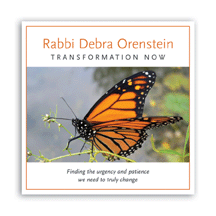The Insecurity of Freedom
(a column by Rabbi Debra reprinted from The Menorah,
a publication of Congregation B’nai Israel in Emerson, NJ)
I love the title of this column. I borrowed it from Rabbi Abraham Joshua Heschel.
In the essay “Religion in a Free Society,” which appears in his collection The Insecurity of Freedom, Heschel wrote:
“Freedom is a challenge and a burden against which we often rebel. [We are] ready to abandon it, since it is full of contradiction and continually under attack…. As a free being, the Jew must accept an enormous responsibility. The first thing a Jew is told is: you can’t let yourself go; get into the harness, carry the yoke of the Kingdom of Heaven.”
Freedom is not license. It does not mean liberation from every concern except your own whim or self-interest. In fact, Heschel argues quite the opposite:
“Freedom’s true essence lies in the human ability to surpass oneself, even to act against one’s own inclinations and in defiance of one’s own needs and desires… Freedom is liberation from the tyranny of the self-centered ego.”
The Children of Israel felt the insecurity of freedom. Within three days of having miraculously crossed the Red Sea on dry land, they wanted to go back to the familiarity of Egypt, to eat onions there, and be satisfied with that. Better slavery than uncertainty. Better slavery than the responsibility to choose. Better slavery than the humiliation of sometimes choosing wrongly. They traded the oppression of Pharaoh for that of a petty inner tyrant.
Passover asks us to be vulnerable. We stand with the band of newly-freed slaves, who didn’t quite believe in themselves or in God, either. They were utterly dependent on God for water and food. They complained a lot. They wanted all the lightness of freedom – the lifting of oppression and hunger and want, but none of its yoke – the demand to use freedom well and make it count for something. In other words, they were a lot like us.
In terms of our political situation and economic opportunities, we are objectively more free than the vast majority of people around the world and across time. Yet, we sometimes feel ourselves completely constrained. And, because of our mindset, we are.
The Passover seders are an ongoing annual Jewish conversation (begun in the 13th century BCE and still going) about what it truly means to be free. That persistent focus prompts us toward social action and freeing captives. Equally, it prompts us to turn inward, to free ourselves from faulty assumptions and false pride.
On Passover, we liberate ourselves from habit and entitlement long enough to remember that freedom is a gift. In Heschel’s words, “it is a gift that may be taken from us.”
“[Freedom] is not an absolute but a relative possession, an opportunity. …It is dangerous to take human freedom for granted, to regard it is a prerogative rather than as an obligation, as an ultimate fact rather than as an ultimate goal. It is the beginning of wisdom to be amazed at the fact of our being free.”
This Passover, may freedom amaze us. A kosher and zissen Pesach to all!


